How to Clean and Care for Quartz Countertops

By Marilyn Syarto
The decision is often hard— granite or quartz countertops? If you’ve chosen quartz for your kitchen or bathroom countertops and/or backsplashes, you’re already familiar with the material’s beauty and how easy it can be to maintain. We’ll emphasize the word “can” when it comes to maintaining.
Although it’s not a demanding chore, learning how to clean quartz countertops properly is not quite as effortless as you may have expected. Our comprehensive guide gives you the invaluable tweaks, tips, and tricks you’ll need to keep in mind if you want to keep your quartz counters looking spectacular for years to come.
Photo via Shutterstock
About Quartz Countertops
What is quartz and why is it a top contender for countertop materials? Quartz is an engineered stone, not a solid stone (like granite or marble). Engineered stone is defined as crushed natural quartz crystals adhered by resins, other binders, and sometimes pigments, which are all combined to form a countertop. And quartz is versatile in color and pattern—sometimes white quartz countertops can even mimic the look of marble.
Here are the pros and cons of owning quartz countertops.
Pros:
- Multi-dimensional with gemlike color
- Wide range of color options
- Non-porous (no holes for anything to seep in)
- Does not absorb bacteria, mold, or mildew
- Odor-free
- Does not need sealing
- Heat-resistant (to medium heat)
- Scratch-resistant
- Can be polished (shiny) or honed (matte)
- No invisible striations that can crack (like granite)
Cons:
- Prone to chipping
- Prone to cracks if exposed to excessive heat or extreme temperature changes
- Has a more uniform look, which does not look as natural as granite
- Considered a luxury material that can be as expensive or more expensive than granite, according to The Home Depot
Quartz vs. Quartzite
What to Avoid When Cleaning Quartz Countertops
It helps to know right away what to avoid putting on quartz countertops. Some manufacturers and experts will say to avoid certain products and ingredients while others may recommend the same ones. If you want to try a controversial ingredient, test it first in an inconspicuous area of your countertop if you can find one (not the underside of a quartz countertop, which is unfinished). Some items may discolor or cause the surface to disintegrate.
To be safe, avoid the following highly acidic, highly alkaline, or corrosive solvents, such as:
- Nail polish remover
- Turpentine
- Bleach
- Drain cleaners
- Oven cleaners
- Dishwasher rinsing agents
- Lemon juice
- Vinegar
- Windex; some experts say it’s OK to use infrequently while others say to never use this product on quartz due to its high pH level
- Disinfectant wipes (may contain bleach)
- Ajax or other granular cleaners, which are mildly abrasive and can cause discoloration. However, some experts say to use it in a diluted paste in an “emergency” to scrape off things like hardened food or spilled nail polish.
Also avoid any abrasive sponges, scouring pads, or razor blades on quartz countertops.
How to Clean Quartz Countertops With Soap and Water
Now that we’ve told you what to avoid when cleaning quartz countertops, we’ll show you the right way to clean them. And trust us when we say it can’t get any easier than this.
Tools and Materials Needed
- Soft cloth or non-abrasive sponge
- Couple drops of liquid dish detergent
- Soft kitchen towel (optional)
Step 1: Fill Bowl or Sink
Fill a bowl or sink with warm water and a couple of drops of liquid dish detergent.
Step 2: Dip Sponge
Dip the sponge into the mixture and use it to wipe down your counters.
Step 3: Rinse
Wring out the sponge, moisten it with plain water, and rinse the countertop with the water.
Step 4: Dry
This is an optional step, but you can dry your counter using a soft kitchen towel.
How to Disinfect Quartz Countertops With Rubbing Alcohol
Rubbing alcohol can disinfect and clean a quartz countertop after a long cooking session. If you have a polished quartz countertop, the alcohol will also make it shine. To properly disinfect, be sure to use 70-percent rubbing alcohol on the countertops; anything under 70 won’t fully disinfect the surface.
Tools and Materials Needed
- Rubbing alcohol (70 percent)
- Clean spray bottle
- Favorite essential oil (optional)
- Clean soft cloth or super soft quality paper towels
Step 1: Mix Water and Alcohol
Mix a combination of 50/50 water and alcohol in the spray bottle. You can adjust the amount of rubbing alcohol you prefer to use. Some also prefer to use full-strength alcohol, but for most, the smell may be too strong.
Step 2: Add Oil
Add five to 10 drops of your favorite essential oil to the spray bottle. Shake vigorously to mix.
Step 3: Spray
Spray the solution all over your countertops, paying especially close attention to areas that may have come in contact with food.
Step 4: Wipe
Use a clean cloth or a few soft paper towels to wipe the counters down. There’s no need to dry the counters—the alcohol will almost instantly dry.
Rubbing Alcohol to Tackle Grease
How to Clean Stains off Quartz Countertops
Since quartz is nonporous, it's pretty resistant to permanent stains, but you may come in contact with spilled food or drinks that have hardened or set on top of the counters. There is a way to loosen them up and scrape them off, but avoid using any abrasive or sharp utensils in order to keep your counters scratch-free. Goo Gone, an adhesive removal product you’ve probably used to remove sticker residue, is recommended for built-up stain removal on quartz counters.
Tools and Materials Needed
- Plastic knife or plastic putty knife
- Goo Gone ( original or kitchen degreaser formula) or baking soda
- Bowl (if using baking soda)
- Wet cloth
- Dry cloth
Step 1: Scrape the Stain
Gently scrape the built-up stain on the countertop with a plastic knife or plastic putty knife. If the stain is not raised, you can skip this step.
Step 2: Apply Goo Gone
Apply Goo Gone to the stain. Leave it on for five to 10 minutes to really penetrate the stain. If you don’t have Goo Gone, you can also use a paste of baking soda and water.
DIY Goo Gone
Step 3: Wipe
Use a soft wet cloth to wipe away the Goo Gone and the stain with it.
Step 4: Dry
Use a soft, dry cloth to dry the area.
Photo via Helen | Hellosewing.com
Tips for Keeping Quartz Countertops Safe
Countertops, no matter what their material, are an investment you want to take care of. Here are a few pointers to keep your quartz countertops safe and clean:
- One wrong move with a sharp knife can cause damage, so always use a cutting board and do not cut food directly on a quartz countertop.
- Use hot pads and trivets when using a slow cooker or air fryer on the kitchen counter and never place a hot hair styling tool directly on the counter. Extreme heat can damage the resin in the countertop.
- Never leave a hot pan on the counter; the sudden temperature change can cause the surface to crack.
- Just because quartz is stain-resistant doesn’t mean it’s stain-proof, so wipe up spills as soon as you can.
- To prevent chips, avoid slamming or knocking glasses, dishes, or cookware onto the countertop’s edges.
- Be careful not to drop a heavy pot or pan on the countertop, which can cause a crack.
- Cover windows with curtains if harsh direct sunlight streams onto the counters. Too much direct sunlight on the countertop can cause a fade in color.
If you have another way to clean a quartz countertop, let us know below! Also, let us know if you have been able to fix any small damages on quartz countertops.
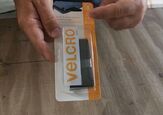
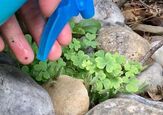

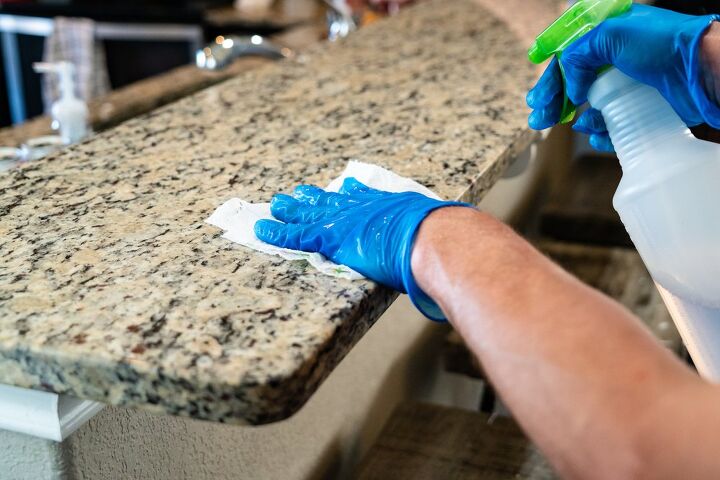

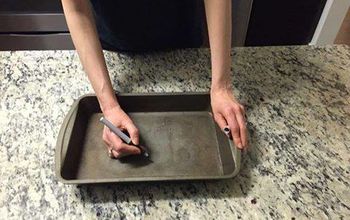
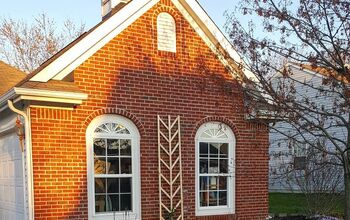


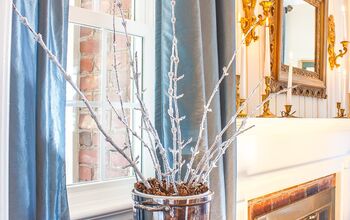
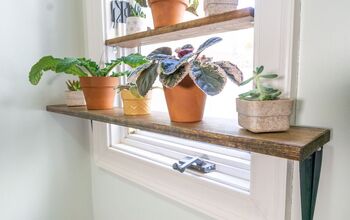
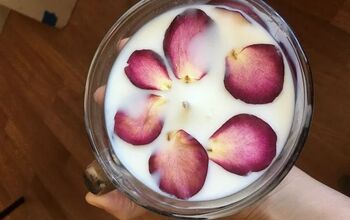


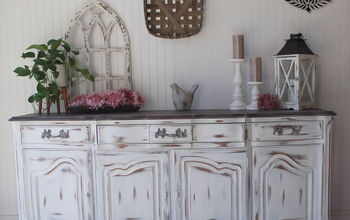
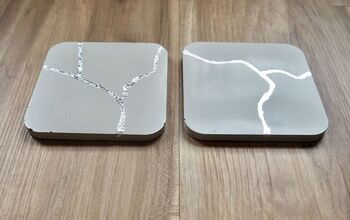
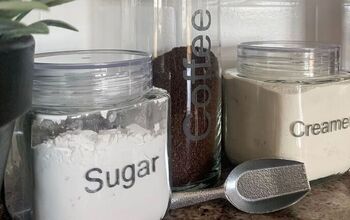
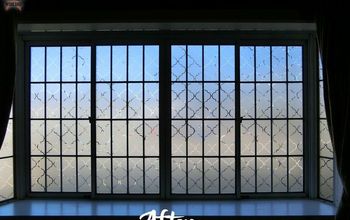
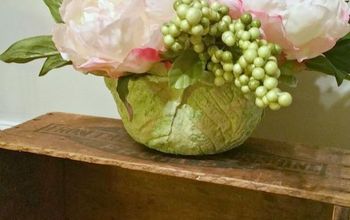

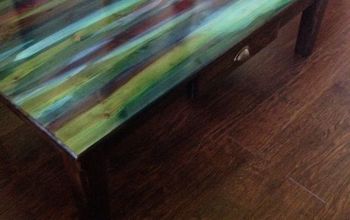
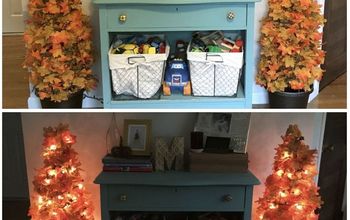
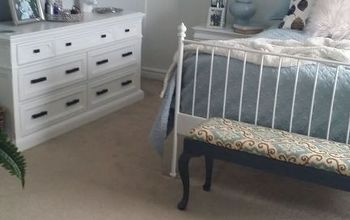

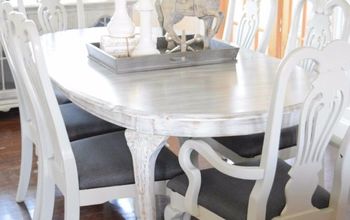
Frequently asked questions
Have a question about this project?
Hi there, how do I get hard water stains and buildup off?? I can't seem to get them off & don't want to scrape.
Thanks, Wendy